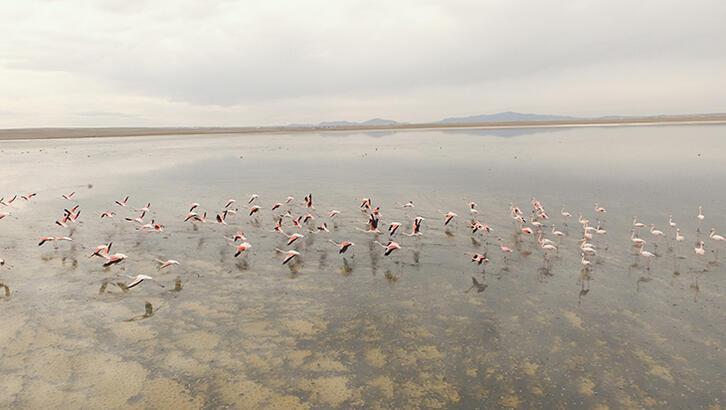
Flamingos that have arrived in Düden Lake in the Kulu district of the Central Anatolian province of Konya early this year due to warmer weather have migrated again due to a shift to colder weathers recently. The lake is currently home to only ducks and a few bird species.
“The flamingos that recently came to the Tuz Lake basin, especially the young flamingos born in this region, came as the weather got warmer. But the weather is cold and there is no food; so, they went back to the Mediterranean and Aegean basins overnight,” Aksaray University Veterinary Faculty Dean Professor Mustafa Cemal Darılmaz said.
Düden Lake, also known as Kulu Lake among locals, is located five kilometers east of Kulu district and north of Tuz Lake nearby. It has an area of 860 square kilometers and has a feature of being closed and shallow.
The lake hosts approximately 42,000 birds of 200 species such as flamingoes, marbled teal, red-crested pochard, ferruginous ducks, whitetail, avocet, greater sand plover, Mediterranean gulls and gull-billed terns. The lake is fed by small streams around it, including Değirmenözü Stream. Nine small islands with bird breeding colonies in the lake are covered in grass in the spring and summer.
Flamingos came to the lake, known as flamingo paradise, early this year due to climate change when the air temperature rose to 20 degrees Celsius in February. But they migrated again after the temperature dropped to minus 18 degrees in recent days.
Stating that there are approximately 700,000 flamingos in the world, Darılmaz said that the Tuz Gölü basin, which also consists of Düden Lake, is one of the important breeding areas of flamingos.
Noting that approximately 22,000 pairs of flamingos come to the basin every year to breed, Darılmaz said, “For flamingos, the Salt Lake region is one of the world’s largest breeding areas. Every year, about 20 to 22,000 pairs of flamingos come to the Salt Lake basin in the spring.”
Stating that the air temperature is very important for migratory birds, Darılmaz said, “The most important factors affecting migratory birds are temperature, water and nutritional source. These three basic ecological factors are very influential in the migration of flamingos. Flamingos are tied to where they were born. Flamingos born here can come here again when the weather gets warmer. When the weather gets colder and there is no food available, they go back to hot regions in the country. They are migrating especially to the Mediterranean and Aegean. There are also those that migrate to North Africa and even Spain.”
Reminding that flamingos can fly 500 kilometers a night, Darılmaz said, “Flamingos generally fly at night. You cannot see flamingos flying in the air during the daytime. On night flights, they can fly an average of 500 kilometers. You can see them in the Tuz Gölü basin at night, and in the Mediterranean the next night. Flamingos that recently arrived in the Salt Lake basin are young flamingos that were born here. They came here as the weather got warmer. But there was no food and they went back to the Mediterranean and Aegean basin overnight. There is nothing to worry about. Flamingos, which are the value of this region, are affected by ecological changes.”